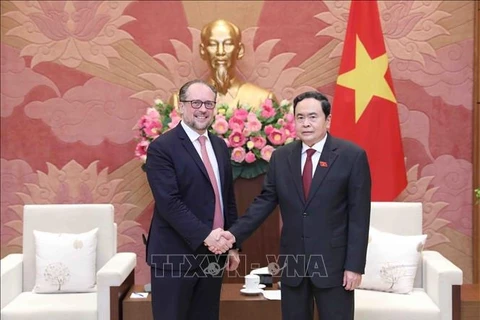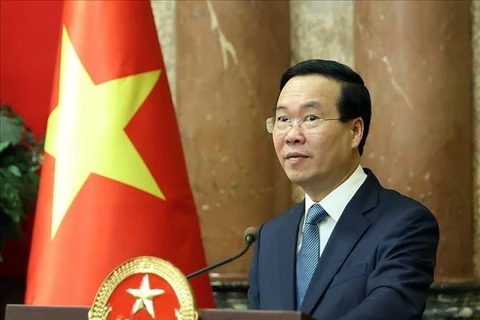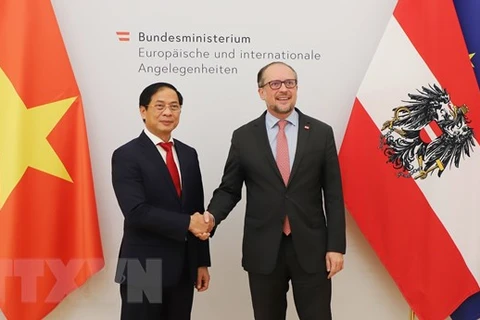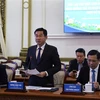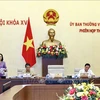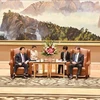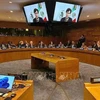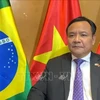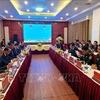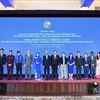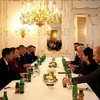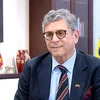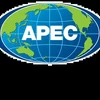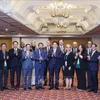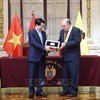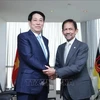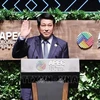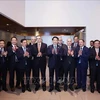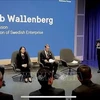Hanoi (VNA) - Vietnamese President Vo Van Thuong’s upcoming official visit to Austria will help tighten relations between the two countries, Austrian Ambassador to Vietnam Hans-Peter Glanzer has said.
The ambassador made the comment in an interview granted to the Vietnam News Agency (VNA) on the threshold of President Thuong’s visit. Following is the full text of the interview.
Reporter: How do you evaluate the achievements in Vietnam-Austria relations, especially as the two countries celebrated their 50 years of diplomatic relations in 2022?
Ambassador Hans-Peter Glanzer: Last year we celebrated the 50th anniversary of the establishment of diplomatic relations between Vietnam and Austria. I think it was an excellent opportunity to take stock of our bilateral relations.
Austria was one of the first countries to establish such relations with Vietnam back in 1972. Since then, relations have developed in an excellent way in various fields, be it political, economic or academic.
Economic relations have developed very well. We have seen bilateral trade volume between Vietnam and Austria has increased many folds in the last 20 years. And last year, we saw a new peak of 1.65 billion EUR (1.8 billion USD) in our trade volume, and I have to say it's a high surplus in favour of Vietnam.
Vietnam is our largest trading partner in the ASEAN region and Austria is between the fifth and seventh most important export market for Vietnam in Europe. That trend was further strengthened by the free trade agreement between the European Union and Vietnam, which entered into force in 2020.
I would also like to mention Austrian investments in Vietnam - we have around 60 Austrian companies with subsidiaries in Vietnam, and around one-third of these companies are engaged in the manufacturing sector.
Reporter: What is the significance of Vietnamese President Vo Van Thuong's upcoming visit to Austria to bilateral cooperation?
Ambassador Hans-Peter Glanzer: It is very good to see visits at a high political level, which are so important for fostering our bilateral relations that have been resumed after the COVID-19 pandemic. Vietnamese Foreign Minister Bui Thanh Son visited Austria at the end of September last year, and our Foreign Minister Alexander Schallenberg was here in Vietnam in mid-April this year.
The visit of President Vo Van Thuong to Austria is of great importance and significance because the visit will help further strengthen our bilateral relations. We are looking forward to intensifying our cooperation in the economic and educational fields. I think such a visit is always a good opportunity to intensify cooperation and to push further certain projects.
Reporter: How are Vietnam-Austria ties expected to evolve in the future?
Ambassador Hans-Peter Glanzer: I see great potential for further deepening our friendly relations. For example, in the economic field, there's definitely more room for Austrian investments in Vietnam. Vietnam's dynamic economic development, its young population and the growing middle class make the country an attractive location for Austrian companies.
Austria can support Vietnam in various fields - for example, in strengthening its industrial capacity, but also with the green economy in the field of renewable energies, and in developing public infrastructure, including the health care sector. There are many opportunities and possibilities.
Vice versa, we also see a lot of opportunities for Vietnamese companies in Austria and Vietnamese investment and Austria. Austria is centrally located in Europe and can also be used as a kind of springboard for other regions in the continent.
In this context, Austria has also provided soft loans in the last year of around 350 million EUR for, among others, the development of the health care sector and transport infrastructure, like the railway sector.
We also see quite a lot of potential for increased cooperation in the educational and academic field, for example, in the field of vocational training, or in the intensified cooperation between the two diplomatic academies, the Diplomatic Academy of Vietnam and the Diplomatic Academy in Vienna, for example.
Reporter: How do you feel about cooperation between Vietnam and Austria at multilateral forums, such as the United Nations, ASEM and ASEAN-EU?
Ambassador Hans-Peter Glanzer: We are facing multiple challenges and crises at the global level, which require cooperation and solidarity as well as a strong multilateral system more than ever. Thus it is important and in the very own interest of our two countries that we pursue active multilateralism both at a global and regional level, be it in the framework of the United Nations or regional ones like ASEAN-EU. I think that is valid for both countries.
One of the big challenges we are facing is climate change. We very much welcome the ambitious goal of Vietnam to become carbon neutral by 2050.
Another global challenge which required common responses and international cooperation was the COVID-19 pandemic - Austria supported the Vietnamese in fighting the pandemic by donating vaccines.
The foundation for our cooperation is the respect for and commitment to a rules-based international order, which both of our countries strongly support; this is also important with regard to safe, free and open trade routes. We all must be interested in the respect for the sovereignty and integrity of nations and the Charter of the United Nations.
Reporter: Thank you very much!
The ambassador made the comment in an interview granted to the Vietnam News Agency (VNA) on the threshold of President Thuong’s visit. Following is the full text of the interview.
Reporter: How do you evaluate the achievements in Vietnam-Austria relations, especially as the two countries celebrated their 50 years of diplomatic relations in 2022?
Ambassador Hans-Peter Glanzer: Last year we celebrated the 50th anniversary of the establishment of diplomatic relations between Vietnam and Austria. I think it was an excellent opportunity to take stock of our bilateral relations.
Austria was one of the first countries to establish such relations with Vietnam back in 1972. Since then, relations have developed in an excellent way in various fields, be it political, economic or academic.
Economic relations have developed very well. We have seen bilateral trade volume between Vietnam and Austria has increased many folds in the last 20 years. And last year, we saw a new peak of 1.65 billion EUR (1.8 billion USD) in our trade volume, and I have to say it's a high surplus in favour of Vietnam.
Vietnam is our largest trading partner in the ASEAN region and Austria is between the fifth and seventh most important export market for Vietnam in Europe. That trend was further strengthened by the free trade agreement between the European Union and Vietnam, which entered into force in 2020.
I would also like to mention Austrian investments in Vietnam - we have around 60 Austrian companies with subsidiaries in Vietnam, and around one-third of these companies are engaged in the manufacturing sector.
Reporter: What is the significance of Vietnamese President Vo Van Thuong's upcoming visit to Austria to bilateral cooperation?
Ambassador Hans-Peter Glanzer: It is very good to see visits at a high political level, which are so important for fostering our bilateral relations that have been resumed after the COVID-19 pandemic. Vietnamese Foreign Minister Bui Thanh Son visited Austria at the end of September last year, and our Foreign Minister Alexander Schallenberg was here in Vietnam in mid-April this year.
The visit of President Vo Van Thuong to Austria is of great importance and significance because the visit will help further strengthen our bilateral relations. We are looking forward to intensifying our cooperation in the economic and educational fields. I think such a visit is always a good opportunity to intensify cooperation and to push further certain projects.
Reporter: How are Vietnam-Austria ties expected to evolve in the future?
Ambassador Hans-Peter Glanzer: I see great potential for further deepening our friendly relations. For example, in the economic field, there's definitely more room for Austrian investments in Vietnam. Vietnam's dynamic economic development, its young population and the growing middle class make the country an attractive location for Austrian companies.
Austria can support Vietnam in various fields - for example, in strengthening its industrial capacity, but also with the green economy in the field of renewable energies, and in developing public infrastructure, including the health care sector. There are many opportunities and possibilities.
Vice versa, we also see a lot of opportunities for Vietnamese companies in Austria and Vietnamese investment and Austria. Austria is centrally located in Europe and can also be used as a kind of springboard for other regions in the continent.
In this context, Austria has also provided soft loans in the last year of around 350 million EUR for, among others, the development of the health care sector and transport infrastructure, like the railway sector.
We also see quite a lot of potential for increased cooperation in the educational and academic field, for example, in the field of vocational training, or in the intensified cooperation between the two diplomatic academies, the Diplomatic Academy of Vietnam and the Diplomatic Academy in Vienna, for example.
Reporter: How do you feel about cooperation between Vietnam and Austria at multilateral forums, such as the United Nations, ASEM and ASEAN-EU?
Ambassador Hans-Peter Glanzer: We are facing multiple challenges and crises at the global level, which require cooperation and solidarity as well as a strong multilateral system more than ever. Thus it is important and in the very own interest of our two countries that we pursue active multilateralism both at a global and regional level, be it in the framework of the United Nations or regional ones like ASEAN-EU. I think that is valid for both countries.
One of the big challenges we are facing is climate change. We very much welcome the ambitious goal of Vietnam to become carbon neutral by 2050.
Another global challenge which required common responses and international cooperation was the COVID-19 pandemic - Austria supported the Vietnamese in fighting the pandemic by donating vaccines.
The foundation for our cooperation is the respect for and commitment to a rules-based international order, which both of our countries strongly support; this is also important with regard to safe, free and open trade routes. We all must be interested in the respect for the sovereignty and integrity of nations and the Charter of the United Nations.
Reporter: Thank you very much!
VNA


